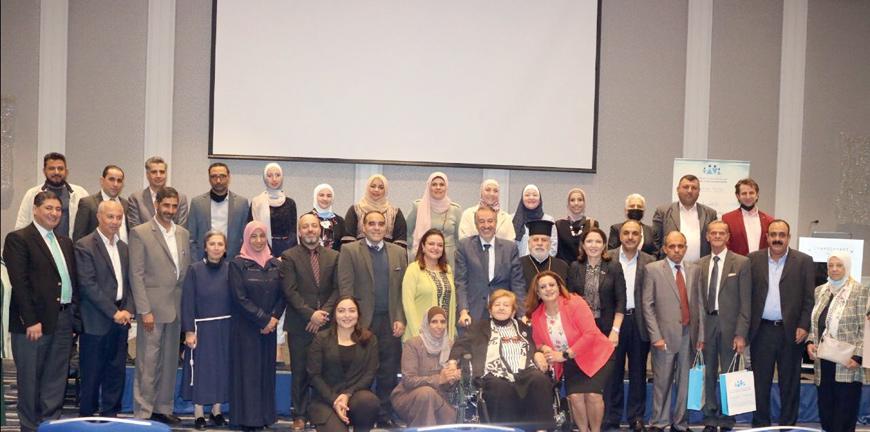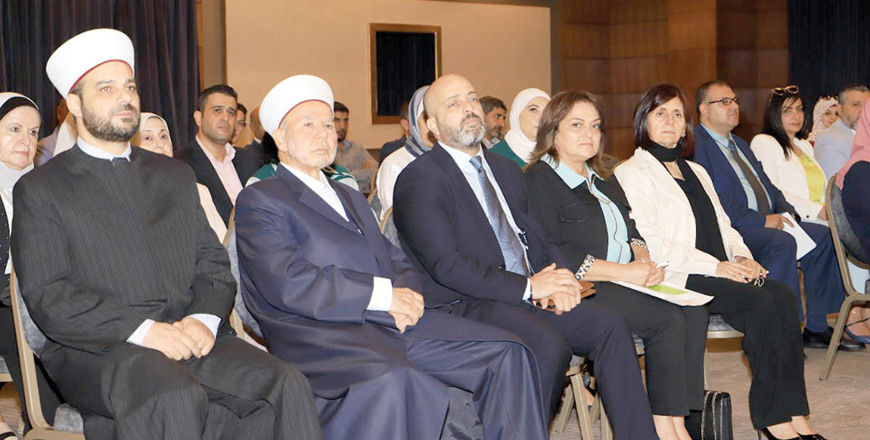You are here
Study highlights challenges facing Kingdom’s elderly care homes
By Batool Ghaith - Nov 02,2021 - Last updated at Nov 02,2021

Attendees pose for a group photo during the release of the results of a study to evaluate elderly nursing homes in Jordan on Monday (Photo courtesy of NCFA)
AMMAN — The National Council for Family Affairs (NCFA) announced the results of their study to evaluate elderly nursing homes in Jordan on Monday as part of their work regarding the issues of the elderly in cooperation with the United Nations Population Fund (UNFPA).
NCFA Secretary General Mohammad Miqdadi said that there are many challenges facing employees in residential nursing homes.
“During our visits to these homes, we witnessed the human aspect first hand in the way staff deal with the elderly, despite the difficult health and psychological conditions of the vast majority of them,” he said.
He added that the NCFA collaborated with UNFPA, the Ministry of Social Development and the National Committee for the Elderly to monitor the needs and services provided to the elderly in nursing homes around the Kingdom and to stand together to combat the challenges facing them.
According to Miqdadi, there are nine elderly nursing homes distributed within four governorates (Amman, Balqa, Irbid and Zarqa). Four of these homes are within the voluntary sector, while four are owned and managed within the private sector.
He explained that the evaluation process was based on methodology consistent with international best practices and experiences in the care of the elderly, in addition to what is described in the Jordanian Constitution as”the protection of old age” and the provisions of local legislation and standards in this regard.
“The results of the evaluation and the outcomes of this study do not necessarily reflect shortcomings in the provision of services for the elderly, but highlight the lack of financial resources in general,” Miqdadi said.
Some homes were unable to provide the necessary support, environment or maintenance for the facilities of the homes, he added.
Arwa Najdawi, elderly issues expert and the study’s conductor, presented the study’s results, challenges and recommendations.
Najdawi said that the number of elderly people residing in residential care homes is currently 355: 172 men and 183 women. This number represents an occupancy rate of 66 per cent of the capacity of all homes until the end of August 2021, compared with 49 per cent at the end of 2016.
“Demographic changes and constantly changing social patterns, such as the migration of children, contributed to the increase in the number of elderly people in care homes,” Najdawi noted.
Najdawi added that some difficulties were faced while conducting the study, such as difficulty when interviewing the families of the elderly. Additionally, the study faced a lack of comprehension or credibility of some elderly residing in the homes regarding their satisfaction with the lack of services provided to them.
The study showed that the ratio of occupancy in elderly nursing homes to the capacity of the elderly is 86 per cent, which is the highest in two nursing homes, while the lowest is 31 per cent in one nursing home.
“The determining factors in the rates of occupancy in care homes are the material allowance for service, the level of services provided and the extent of communication with the parents and children of the elderly, especially in the case of immigration from the country, the location and the availability of transport,” Najdawi added.
The study recommends raising the ceiling for the service purchase allowance for the elderly whose services are purchased through the Ministry of Social development to become JD300 per month.
The study also recommends establishing a training centre specialising in the care of the elderly and providing it with qualified personnel, and to implement training programmes for staff working in care homes on case management procedures to deal with the psychological and social conditions of the elderly.
Najdawi emphasised the importance of strengthening cooperation between health centres and nursing homes in terms of adherence to inspection visits by doctors, nurses and psychiatrists as stipulated by the prime minister’s decision and instructions.
Related Articles
AMMAN — The proportion of older persons is predicted to increase both locally and globally, said the National Council for Family Affairs (NC
AMMAN — Secretary-General of the National Council for Family Affairs (NCFA), Muhammad Miqdadi and Secretary-General of the Jordan Hashemite
AMMAN — A local study released last week recommended initiating a national strategy for the elderly which would include recommendations such


















